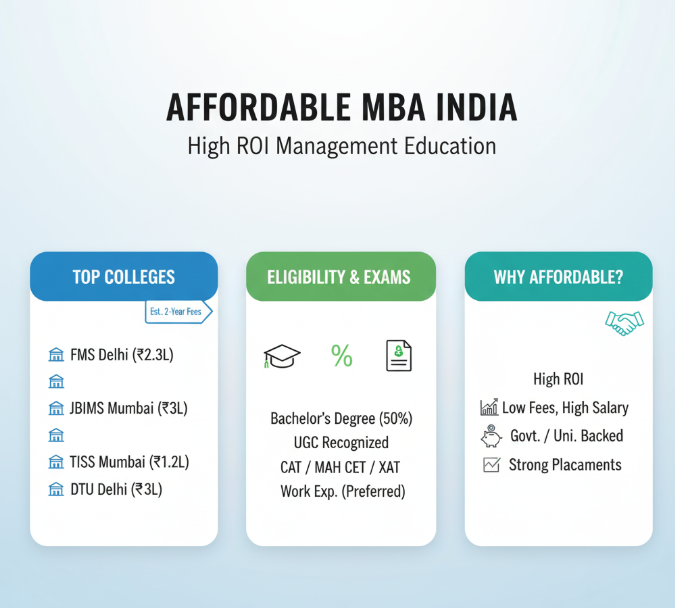Affordable MBA Colleges In India: The Master of Business Administration (MBA) is one of the most sought-after postgraduate degrees in India, with numerous options for profitable and well-paying jobs in a variety of industries. Although obtaining an MBA is typically linked to a substantial financial commitment, prospective students should be aware that this objective does not always need paying a high tuition cost. A greater number of people may now afford top-notch management education since many esteemed institutions, especially government schools and universities, offer their flagship MBA programs at far cheaper fees than their private sector equivalents.
Candidates on a limited budget might realistically look for esteemed universities with an excellent reputation thanks to this crucial distinction. Respected establishments like the Faculty of Management Studies (FMS) in Delhi and the Jamnalal Bajaj Institute of Management Studies (JBIMS) in Mumbai are renowned for fusing affordable tuition with exceptional academic standards and placement histories. This suggests that affordability and prestige do not have to conflict in the context of management education in India. The best affordable MBA schools in this area have been selected based on their outstanding professors, outstanding placement records, and first-rate facilities, all while keeping the total tuition cost around INR 7 lakhs. For aspirational students, investigating these cost-effective choices is the best way to secure a fulfilling managerial career without taking on excessive student loan debt.
Top 10 Affordable MBA Colleges in India

This list focuses on universities that have a very high return on investment (ROI) because of their low tuition costs and superior placement rates.
| Rank | College Name | Location | Approximate Total 2-Year Fee (INR) | Primary Entrance Exam |
| 1 | Faculty of Management Studies (FMS) | New Delhi | ₹2.32 Lakhs | CAT |
| 2 | Department of Financial Studies (DFS) | New Delhi (Delhi University) | ₹52,000 – ₹70,000 | CAT |
| 3 | Department of Commerce (DSE) | New Delhi (Delhi University) | ₹30,000 – ₹40,000 | CAT |
| 4 | Tata Institute of Social Sciences (TISS) | Mumbai, Maharashtra | ₹1.2 Lakhs – ₹2.5 Lakhs | CUET-PG (TISSNET discontinued) |
| 5 | Jamnalal Bajaj Institute of Management Studies (JBIMS) | Mumbai, Maharashtra | ₹3.05 Lakhs – ₹6.10 Lakhs | MAH CET, CAT |
| 6 | University Business School (UBS) | Chandigarh (Panjab University) | ₹40,000 – ₹1.5 Lakhs | CAT |
| 7 | Sydenham Institute of Management Studies, Research & Entrepreneurship Education (SIMSREE) | Mumbai, Maharashtra | ₹1.35 Lakhs – ₹1.60 Lakhs | MAH CET |
| 8 | Department of Management Sciences (PUMBA) | Pune, Maharashtra (SPPU) | ₹1.33 Lakhs – ₹2.5 Lakhs | MAH CET, CAT |
| 9 | Institute of Management Studies (IMS) | Varanasi, UP (BHU) | ₹98,000 – ₹1.5 Lakhs | CAT |
| 10 | Delhi Technological University (DTU), School of Management | New Delhi | ₹3 Lakhs – ₹4 Lakhs | CAT |
Also Check:
Swiss Government Excellence Scholarships 2026-27: Application Process, Steps to Apply
Top 20 AIIMS Colleges in India 2025: Ranking, Courses, Details here
IIT Bombay Launches Mission 'Daksha' to Build Powerful Telescopes & Satellites
Rhodes Scholarship: Application Process, Requirements and Other Details
UGC Approved 5 Foreign Universities Campuses in India; Detailed List here
MEXT Scholarship 2025: Eligibility, Criteria and Application Process
Chevening Scholarship 2026: Eligibility, Benefits, Application Process & Important Details
Affordable Colleges to Study MBA: Eligibility Criteria
The basic requirements for admission to MBA programs, especially the most reasonably priced ones in India, are often standardized, guaranteeing a constant standard of academic readiness for candidates. First and foremost, all applicants must have earned a Bachelor's degree in any field. 10+2+3 or 10+2+4, which denotes a full-time, systematic progression from school to university level, is the recommended educational plan.
Also, applicants must have completed their undergraduate coursework with at least a 50% cumulative score, with a small exception to 45% for reserved categories. The undergraduate degree must be earned from an institution approved by the UGC Act; this is a non-negotiable criteria that guarantees the fundamental qualification is legitimate and acknowledged by the government.
As long as the institutions are legally recognized and the entire degree duration is set up as a 3+2 year pattern (3-year Bachelor’s plus 2-year Master’s), degrees from students whose education deviates from the norm—such as those from open universities or correspondence programs—are accepted. Securing a spot in these coveted, high-ROI programs requires adherence to these requirements.
Affordable Colleges to Study MBA: Admission Process
The most renowned and reasonably priced MBA schools in India have admissions procedures that call for meticulous, multi-phase preparation. Verifying total compliance with the eligibility requirements, which normally demand for a Bachelor's degree with a minimum cumulative score (usually 50%, with exceptions for restricted categories), is the fundamental first step. Any violation of these guidelines, even at this late stage, will result in admission being revoked.
After their eligibility has been verified, candidates want to start planning strategically. This starts with picking the ideal MBA program that fits your career objectives. For instance, you may pick a college in Bangalore that specializes in human resources or in Mumbai that specializes in finance, and you could choose between normal, online, or remote learning.
Also Read:
Top IIT Colleges That Offer Data Science Courses to Learn Online in 2025
Best Free AI Courses for Beginners in 2025
Best Pharmacy Colleges in India 2025 After 12th Offering High Job Placement
To stay updated on current trends, join the Jagran Josh Telegram Community!
